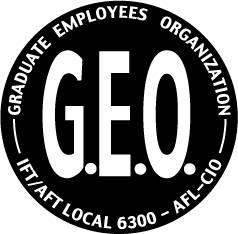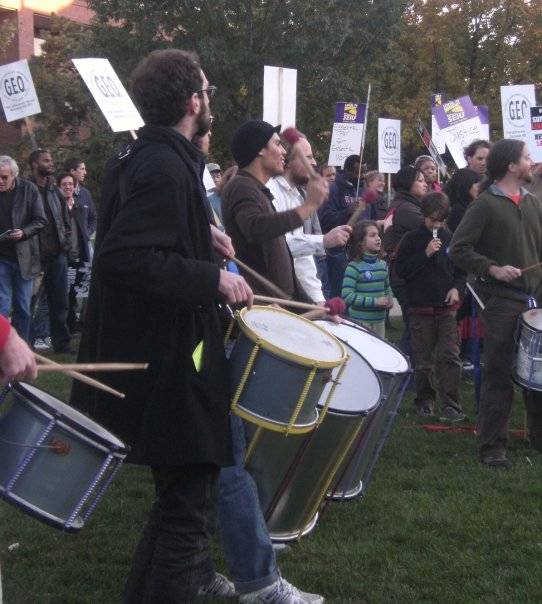
If you frequent the University of Illinois campus, chances are you have heard of the Graduate Employees’ Organization. And if you’re a graduate student, you are likely a member or will be more encouraged to become one after reading this interview.
Adhering to their mission, the GEO works to find common ground among all graduate employees, regardless of race, gender, religion, disability, sexual orientation, citizenship status, department, job category or membership in the union. Membership in the GEO is voluntary and the group strives to be inclusive and open to all graduate employees, operate along democratic principles, act always in the best interests of graduate employees and act responsibly toward the entire University community.
The GEO has an incredibly rich history. The group’s organizing and collective bargaining efforts have significantly increased the well being of graduate students and their families. Last’s week article about possible reductions in tuition waivers for 25% Graduate Assistant appointments illustrated how the GEO was right there from the beginning of the issue. From the get-go, they have been organizing and articulating precisely what is happening and how such a move could by the University’s administration would be detrimental to those driving a lot of energy into it.
As a member-driven organization, the GEO has made a number of significant improvements in working conditions for graduate employees. To date, the most significant improvements include increased stipends, dental insurance, vision care, a full subsidy of the McKinley Fee, a partial subsidy of student insurance, and strong protections against overwork, discrimination and arbitrary discipline. For this next installment of Getting Things Done, Smile Politely interviewed Brian Dolber, one of the GEO’s core members, and learned that the passion runs deep and is not on the wane anytime soon.
Name: Brian Dolber
Age: 27
Position at the Graduate Employees’ Organization (GEO): Former Co-President, and currently the Steward’s Council liaison to the Coordinating Committee.
SP: What does Getting Things Done mean to you?
BD: Getting things done means moving closer towards a goal, and making a tangible, material difference in your environment.
SP: How did you first get involved with the GEO?
BD: I am a unique case. I became involved with the GEO on my first day at the University of Illinois at the TA orientation in 2005. I knew there was a grad union here, and actually sought them out! I come from a union family, and I worked with the Service Employee’s International Union and the American Federation of Teachers before coming to grad school. Most GEO members, however, become active when they hear about the union from colleagues in their department, or when they have a specific problem related to their appointment, to their insurance, or some other issue that makes them realize that being a graduate employee is not a glamorous job.
SP: What are some of the GEO’s organizational goals for 2009?
BD: The GEO is moving into bargaining this semester, which means we need to mobilize as many people as possible to fight for the treatment they deserve. This is particularly difficult in an economic crisis. The administration is going to make negotiations difficult for our union, and every other union on campus. They will claim that resources are tight, and that we all need to sacrifice. What the GEO needs to demonstrate is that we already sacrifice. Our labor allows the university to function, and our pay and benefits don’t allow us to give up much more. This is especially true for grad employees with families, and international students. Instead of givebacks, we have to show the University that we deserve a living wage, improved healthcare, and job protection. In spite of — or, more accurately, because of — the recession, we need to make sure that graduate workers are protected now more than ever.
SP: How many members does the GEO currently have?
BD: The GEO represents about 2,800 teaching assistants and graduate assistants, and has about 1000 additional associate members, who are research assistants, on fellowship, or have other arrangements with the university as graduate students. All grad students can become members, simply by signing a card. That allows you to vote in GEO elections and on important decisions.
SP: What would you say is the GEO’s greatest accomplishment to date?
BD: Our greatest accomplishment is gaining recognition from the university. Not all grad employees are represented by a union, and it took over a decade for this to be the case at the University of Illinois. As you would imagine, this didn’t happen without a fight. GEO members had to take over Swanlund Hall, the administration building, in 2004. As a result, the State granted teaching assistants and graduate assistants collective bargaining rights.
SP: Name three things most people do not know about the GEO:
BD: First, any grad student can be involved with the GEO. You don’t even have to be a graduate employee. While our contract, by law, only covers TAs and GAs, all grad students benefit from the changes we advocate for, so it makes sense to join and be involved.
Second, while we’re fortunate to have the GEO here, we are not in a unique position. Grad students have been forming unions since the 1960s at other Big Ten campuses such as U Michigan and U Wisconsin. We see ourselves as being in solidarity with these unions, advocating better conditions for workers, and making education a priority in our political culture. The growth of grad unions is a testament to the increased reliance on contingent labor in the university system, which has a detrimental impact on education and academic freedom, and the widespread insistence of contingent workers for basic protections.
Third, the GEO doesn’t just complain and protest! We believe that we can put forth a better vision for higher education and workplace environments, one that respects diversity of backgrounds and beliefs, and one that encourages community over individual isolation. In order to cultivate this, we have social hours at local bars and coffee shops, and support activities such as the recent LGBTQ Caucus Drag Show and a new soccer team.

SP: Are there other local or global not-for-profit organizations whose work you admire?
BD: Absolutely. I study media and communications history, and I think we are very lucky to be in a town with two community radio stations, WRFU and WEFT. WRFU operates out of the Independent Media Center, while also publishing the Public-I, and hosts events for many organizations that are of likeminded with the GEO. At a larger scale, I admire the entire trade union movement. While at the level of national and international leadership all unions have their problems and their assets, in essence, unions are working people taking the initiative to improve their lives and their world. They really don’t get enough recognition in our culture, and I’m glad that GEO can be a small part of that.
SP: What keeps you motivated?
BD: The small, slight hope that things will improve because, historically, it has happened, and the absolute necessity that things do improve. It’s actually easier to be motivated now than it ever has been. Crisis brings opportunity, and people are frustrated not only with the university but the entire political economic system. I think our society is about to undergo some massive changes, and the GEO and the U of I will be part of that, for better or worse. It’s the GEO’s job, as well as the other unions on campus, to make sure that it’s for the better.
SP: What are your hopes for grassroots organizing in the future?
BD: I think we need to remember that grassroots organizing involves talking to people and maintaining a community. This is difficult, as we emerge from the neoliberal era, where the dominant ideology has been individualism. It might be ironic to say this on a blog, but there is far too much reliance among activists on the Internet. Most of the Web sites we use are commercially driven, and the technology itself does not afford us the experience of interpersonal communication. That said, I think this political moment brings with it a lot of promise. I have mixed feelings about Obama, and I am wary of becoming too heartened by any President, but I think it is significant that he is a former community organizer. It excites me that someone in power understands what that means, and if we can actually organize, there is someone who might feel compelled to listen.








